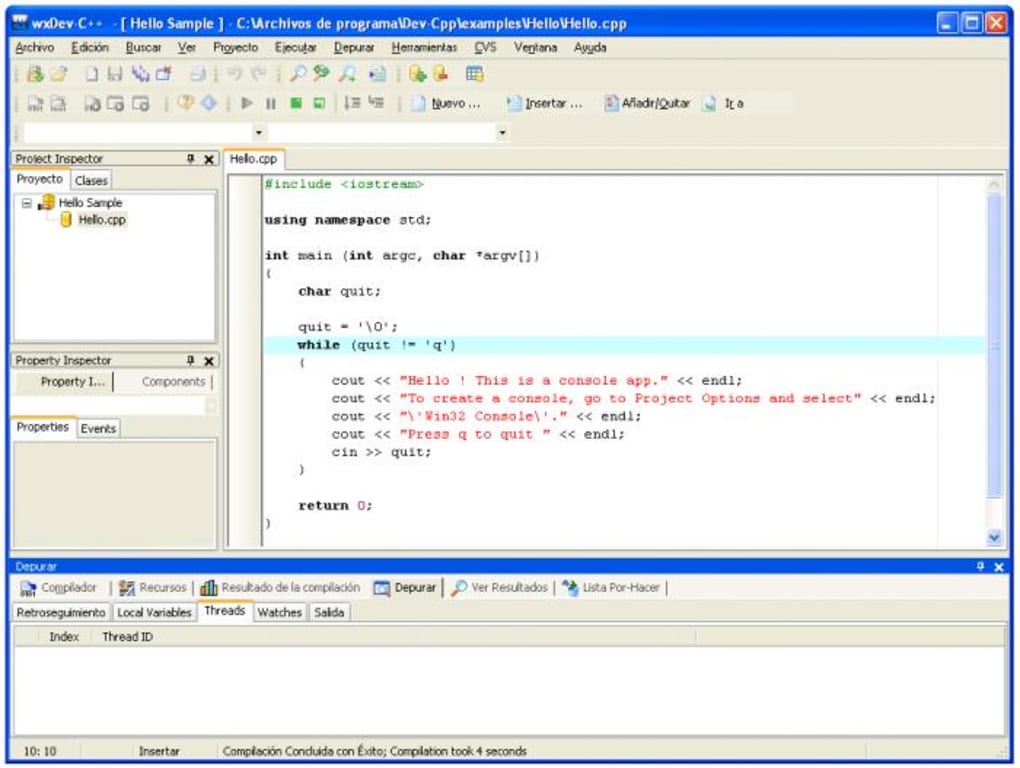Dev C++ Ind R
This was a very noble attempt to keep Dev-C alive, up until the point when it stopped being updated. As I'm writing this review (2016-09-14) the project's last update was over a year ago (2015-06-14). At this point, one should download the 'No Compiler' release and try to configure it. The organization is based on The Annotated C Reference Manual by Margaret Ellis and Bjarne Stroustrup and on the ANSI/ISO C International Standard (ISO/IEC FDIS 14882). Microsoft-specific implementations of C language features are included. For an overview of Modern C programming practices, see Welcome Back to C. Setup releases contains Dev-C in setup form. Portable releases contains Dev-C in zipped form. Use devcppPortable.exe to store configuration files inside the program folder. Compilers contains various compilers compatible with Dev-C. Tools contains compiled versions of the tools provided in the Git repository.
It's been a while again. Enjoy the new features. :)Changes - Version 5.11 - 27 April 2015
- Fixed crash related to double clicking on a compiler error when a selection was made.
- Upgraded the default compiler to TDM-GCC 4.9.2.
- Improved startup speed.
- Fixed Abort Compilation button not working anymore.
- Fixed crash in TCppParser.CheckForTypedefStruct.
- Fixed crash in TCppParser.HandleEnum.
- Fixed some typos in the English translation (thanks to Hiro5).
- Updated the Catalan translation (thanks to Hiro5).
- Updated the Czech translation (thanks to tringi).
- Fixed some hiccups in the build process of Dev-C++ itself.
Download
Dev C++ Ind Real Estate For Sale
- The setup which includes TDM-GCC 4.9.2 (32bit and 64bit) can be downloaded here (47MB).
- The setup which does not include a compiler can be downloaded here (2MB).
- The portable version which includes TDM-GCC 4.9.2 (32bit and 64bit) can be downloaded here (34MB).
- The portable version which does not include a compiler can be downloaded here (2MB).
- The latest tested compilers can be downloaded here.
- Lastly, the source code can be found here (1MB). Alternatively, one can use git to clone any commit. Instructions can be found here.
- C++ Basics
- C++ Object Oriented
- C++ Advanced
- C++ Useful Resources
- Selected Reading
A scope is a region of the program and broadly speaking there are three places, where variables can be declared −

Inside a function or a block which is called local variables,
In the definition of function parameters which is called formal parameters.
Outside of all functions which is called global variables.
Dev C++ Indir
We will learn what is a function and it's parameter in subsequent chapters. Here let us explain what are local and global variables.
Local Variables
Variables that are declared inside a function or block are local variables. They can be used only by statements that are inside that function or block of code. Local variables are not known to functions outside their own. Following is the example using local variables −
Global Variables
Global variables are defined outside of all the functions, usually on top of the program. The global variables will hold their value throughout the life-time of your program.
A global variable can be accessed by any function. That is, a global variable is available for use throughout your entire program after its declaration. Following is the example using global and local variables − Kontakt 5 vst crack mac.
A program can have same name for local and global variables but value of local variable inside a function will take preference. For example −
When the above code is compiled and executed, it produces the following result −
Initializing Local and Global Variables
When a local variable is defined, it is not initialized by the system, you must initialize it yourself. Global variables are initialized automatically by the system when you define them as follows −
| Data Type | Initializer |
|---|---|
| int | 0 |
| char | '0' |
| float | 0 |
| double | 0 |
| pointer | NULL |
Dev C++ Indir 5.11
It is a good programming practice to initialize variables properly, otherwise sometimes program would produce unexpected result.